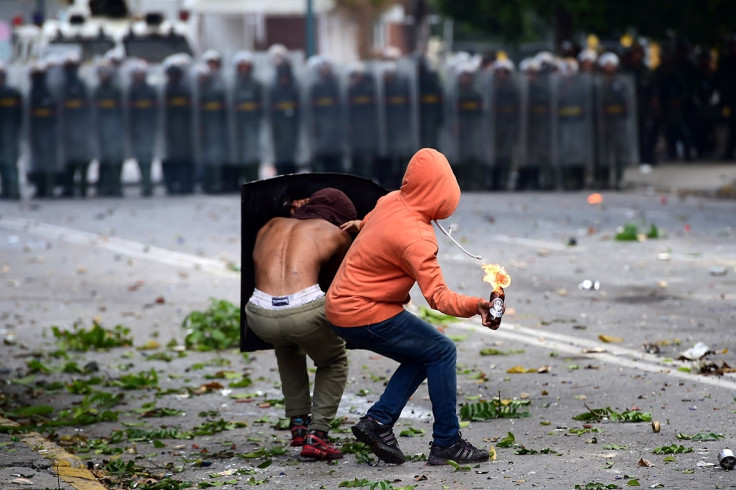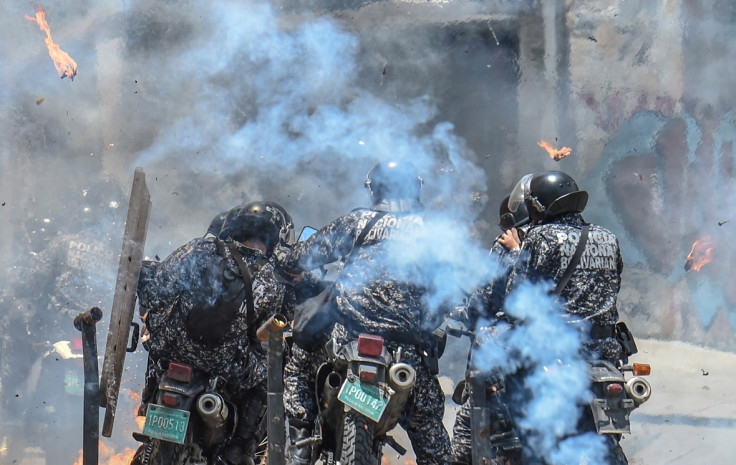The real problem with Jeremy Corbyn's vacuous statement about violence in Venezuela
There's no moral equivalence between Maduro's authoritarian state and people fighting against it.
Drawing attention to an opponent's 'hypocrisy' is one of the most ubiquitous political attack lines. It has its uses of course – there are few things more satisfying than learning that some purveyor of 'family values' has been caught on his knees in a dingy public toilet – but more often it is deployed as a misdirection technique. 'What about 'X'?' demands the person who has no more interest in 'X' than he or she does in Morris dancing.
There has been a lot of it recently from those who once saw Venezuela as proof that 'another world is possible', as the corny saying goes. Now that the country is turning into the sort of nightmare dreamt up by JG Ballard, former enthusiasts are drifting away as indifferently as pigs from an empty swill bucket.
Or at least most of them are. Others have gone on the offensive by seeking to impugn the motives of anyone speaking out. In these conspiratorial times where the sinister hand of the 'establishment' is thought to be behind nearly everything, it is no longer enough to come to a decision based on what a person has said. Instead you must unmask their 'real agenda'.
The other technique used to detract from the seriousness of an argument is moral equivalence, and this appears to be the method preferred by Labour leader Jeremy Corbyn when it comes to Venezuela. In a statement released yesterday, Corbyn decried "the violence done by all sides" in Venezuela and called for "a dialogue".
Of course, many commentators on the left have belittled the idea that Corbyn ought to have any public position on Venezuela at all. And truthfully, the notion that Venezuelans are particularly interested in the musings of a British political leader has a rather imperialist tone to it. We – and I use the term loosely – are simply not relevant in Venezuela, nor in vast swathes of the world, as painful as that is for some to swallow.

But it is not unfair to expect Corbyn to pass comment on a country that was something of a hobby horse for him and many others when things were going well. If you lionise something and it turns out to be rather less glorious than your original predictions suggested, and if it transpires that you were a little naive and – dare I say it – credulous when you made them, you cannot blanch when people want to know why you got it so wrong. Not least when you are hoping to be elected Prime Minister.
The worst part of Jeremy Corbyn's statement on Venezuela is not the sheer vacuousness of it (what is the use of 'dialogue' in a country where people are routinely imprisoned for what they say?), but rather the false equivalence it draws between the authoritarian Venezuelan state and the people on the streets protesting against it. Condemning "all forms of violence" in Venezuela is like fulminating about 'violence against both sexes' when a man rams his fist down his wife's throat.

There are more overtly political analogies which can be used to make the same point. When the American police shoot dead an unarmed black man, or when Israel bombs the Palestinians, or when fascists attempt to march on an estate or university campus, it is usually liberals and conservatives who are unable to discern between the varying degrees of power at play. As a consequence they will emit some banality about 'despising one thing but also the other'. This soon metastasises into glib campaigns proclaiming that 'all lives matter', or declarations that the real threat to civilisation is not Donald Trump but censorious college kids.
The irony is that Jeremy Corbyn has come out with the sort of trite platitude the left is, in normal circumstances, firmly against, not least because it is a formula which blurs the distinction between those with power and those without it. Corbyn's old friend Tony Benn used to have five questions which he said you should ask the powerful, the first of which was: What power have you got?
In the case of Venezuela's opposition – a disparate cross-section of the population rather than a homogenous bloc – the answer is 'not much'. Certainly not when set against a state which has already used violence to shut down the country's only real parliament, neutralise the judiciary, and put its most vocal opponents behind bars.
In a world governed by the strong, the weak must occasionally make their own rules or perish. This is as true in Venezuela as it is anywhere else, and does not become any less true simply because the regime there proclaims itself socialist.
The problem with seeking a foreign utopia is that you are always just a few time zones away from turning into a Daily Telegraph editorial, damning protesters, and apologising for power.
And as his statement on Venezuela demonstrated, even Saint Jeremy is not immune.
© Copyright IBTimes 2025. All rights reserved.






















